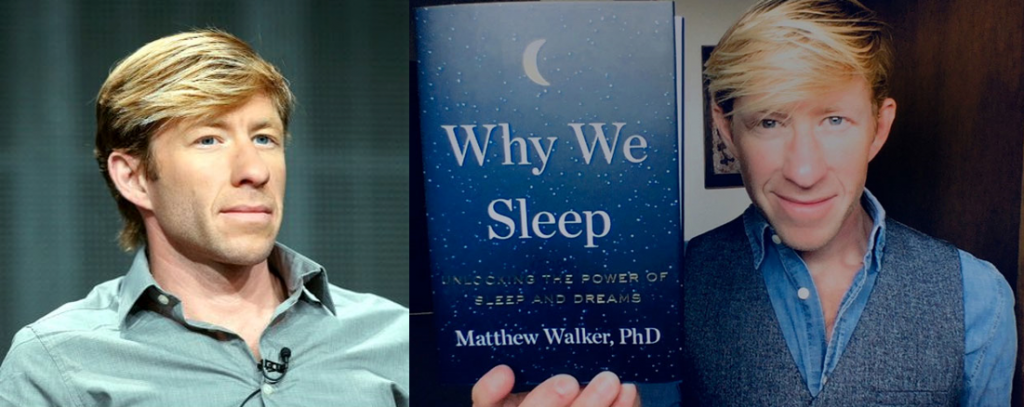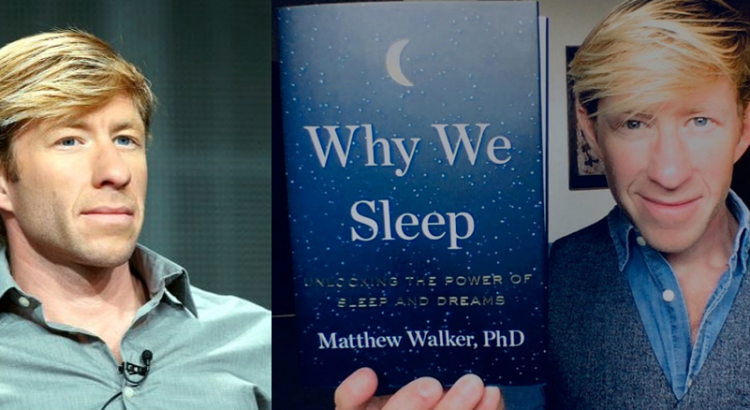Modern society despises sleep. You can see evidence of this by the way we talk about it.
“I’ll sleep when I’m dead!” workaholics and party goers exclaim at 2 AM on a Saturday.
“Sleep is the cousin of death,” Nas rapped.
“The only thing that comes to a sleeping man is dreams,” 2Pac proclaimed.
The math seemed simple–if you sleep less, you can work more.
But we were wrong.
Research over the past few decades has revealed without a shadow of a doubt that sleep is non-negotiable. If you want to perform at your best, look your best, and feel your best, you must sleep well every night. Sleep is foundational to all aspects of health–physical, mental, emotional, or social. Missing even just a few hours of sleep for one night comes at a high price. The worst part is that sleep deprived people are unable to realize how sleep deprived they are because their brain isn’t functioning properly–so they think they’re fine when they’re not.
Why We Sleep: Unlocking the Power of Sleep and Dreams by Matthew Walker is a must-read in today’s overstimulated world. Our globetrotting, tech-connected, 24-hour workaholic society has put sleep on the bottom of our priority list. Limitless sources of entertainment and distraction at all hours of the day has made sleep feel like an inconvenience.
Something has to change.
Who is Matthew Walker?


If there’s anyone who knows anything about the mysteries of sleep, it’s Matthew Walker, PhD, a neuroscience and psychology researcher/professor at Berkeley (previously, Harvard Medical School, and since 2017, a sleep scientist at Google Life Sciences.) Matthew Walker has published over 100 scientific research studies and has spent most of his adult life on the frontier of sleep science and research.
While studying patients with dementia early in his career, Walker found that people with Alzheimer’s displayed a unique brain wave signature that was only detectable during sleep. The connection between Alzheimer’s and sleep prompted Walker to begin studying sleep. But to his dismay, Walker discovered that science didn’t know much about sleep. Walker’s subsequent detour to understand the mysteries of sleep–which he thought would only take two years–ended up taking over twenty.
Fortunately, you don’t need to hunt Walker down and offer to buy him lunch to pick his brain. All of his knowledge on sleep was conveniently rolled up into his comprehensive October 2017 book, Why We Sleep: Unlocking the Power of Sleep and Dreams.
The book, which took Walker four years to write, became an International Bestseller, and was even included on Bill Gates’ personal list of 5 recommended books for the 2019 holidays. Walker has also spoken at many conventions, TV shows, radio outlets, and podcasts, some of which you can find online. In fact, I became aware of Matthew Walker when he appeared on Joe Rogan’s Podcast.
The Harrowing Downsides of Sleep Deprivation
Why We Sleep is a merciless wrecking ball of truth to most people’s unsophisticated beliefs about sleep.
Reading about the downsides of losing even a small amount of sleep is disturbing and overwhelming.
- After just one night of 4 hours of sleep, your immune system’s number of cancer-destroying cells decline by 70 percent!
- In addition, you are 60 percent more emotional, which means you’ll be handicapped when it comes to socializing and decision-making. So, for instance, you’ll perceive someone to have insulted you when no insult was given at all.
- Also, you’re less fertile when sleep deprived; people become subconsciously repulsed by you as their immune system ramps up in your sleep-deprived presence; you age quicker, and you’re perceived as less attractive (after just one night of bad sleep when surveyed by strangers.)
- (See Everything That Happens When You Don’t Get Enough Sleep.)
Epiphanies
Anyone older than 25-years-old who reads this book will likely reflect on their poor sleeping habits over the years in horror, but as you connect the dots, you might experience some epiphanies.
The short-tempered might discover that they’re not actually hopelessly grumpy, but simply poor souls who had chronically sleep-deprived themselves due to the belief that working around the clock was necessary for success.
Or, you might realize that your diet didn’t yield the results you were hoping for because you weren’t getting enough sleep. (Strangely, two people of identical age and build can eat the same exact diet but get different results simply because one slept well and the other didn’t; it’s a case of one plus one equaling “two” for the well-rested person, and one plus one equaling “barn door” for the non-rested person.)
Scare Tactics?
Some people misinterpreted Matthew Walker’s relentless unleashing of sleep facts as scare tactics, but I personally didn’t perceive it that way. For someone like me, who never took sleep seriously during my younger years, I needed to be bombarded with study after study, and fact after fact in order to change my false, ignorant beliefs about sleep.
Sleep: the Fountain of Youth
On the bright side, the benefits of sleep outlined in the book are just as incredible, if not more incredible, than the downsides. From being perceived as more attractive, to being mentally sharper and creative, to physically performing as if you’ve taken steroids—sleep is the closest thing to the fountain of youth that we have on earth, and science has finally accumulated the studies to prove it, unequivocally.
It’s worth mentioning Juan Ponce de Leon, the Spanish explorer who went searching for the fabled Fountain of Youth in the 1500s, only to die at 46 doing so, in Florida, from a wound received during a skirmish with an indigenous tribe. (He would have been better off simply buying a more comfortable mattress.)
Can’t find an answer? Look harder…
Why We Sleep is an extremely thorough and comprehensive book; so much so that at times it can be difficult to find an answer to a specific question because the book is dense. Some reviewers have wrongly stated that the book failed to discuss “Topic X” or “Topic Y”, yet I would browse and find the section where that topic is discussed.
In my opinion, the Table of Contents could have been expanded a bit more. There are four main sections to the book, with sub-sections that each have sub-sections of their own. Unfortunately, the sub-sections of the sub-sections do not make it to the Table of Contents, which is a shame because they could each technically be a chapter of their own. If you have the digital version of the book, it might be easier to find what you’re looking for. However, physical copies are usually preferable, especially for home use.
…Unless the answer doesn’t exist, yet.
Researchers like Matthew Walker have covered an incredible amount of ground in the past few decades to unravel the mysteries of sleep. However, there are still some things that scientists don’t know about sleep. So, if you bought this book to learn about certain things, like marijuana’s effects on sleep, you might be disappointed. Scientists haven’t studied marijuana’s effects on sleep as much as alcohol and caffeine. Perhaps that’s because alcohol and caffeine are legal, while marijuana hasn’t been for many years. Since marijuana has been legalized in places like Canada, the research should eventually catch up.
Best believe that Matthew Walker, the ambassador of sleep, will relay that information to the public as soon as it’s available and conclusive. For that reason, apart from recommending his book, I also recommend following Matthew Walker on Twitter @SleepDiplomat for real-time updates where he’ll alert you on which podcasts he has recently been on, places he will be speaking, etc. He also has a website, www.sleepdiplomat.com where he posts videos and links directly.
In closing, being educated about something so vital as sleep is preferable to being ignorant; that’s why I say this book is a must-read, being that it’s the best resource on sleep you’ll find to date. Even if you don’t change anything about your current lifestyle after reading the book, at least the next time you’re confronted with the decision of pulling an all-nighter, you can make an informed decision, even if you ultimately decide that the all-nighter is worth the hit to your health.

